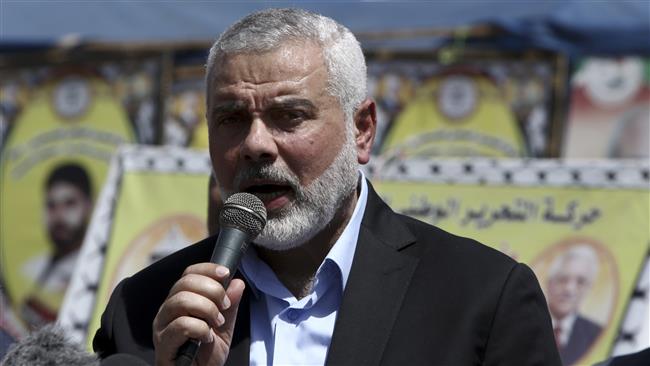
RNA - “As our today’s martyrs are different from those in the past, our present battle doesn’t bear much resemblance to previous ones. Today, we are bound to put up resistance [in the face of Israel],” Ismail Haniyeh said on Saturday.
He said that Ibrahim Abu Thuraya and three other Palestinians, who were shot dead on Friday by Israeli troops during protests against US President Donald Trump's recognition of Jerusalem al-Quds as Israel's capital, proved to the whole world that “the Palestinian people will never compromise its rights and capitulate.”
Haniyeh added, “No one can dispute the fact that al-Quds belongs to Palestinians. We strongly believe in our final victory through God’s assistance, and will not step back one iota from right to entire al-Quds.”
Meanwhile, a senior official of the Lebanese Hezbollah resistance movement says his group will spare no effort to support the anti-Israel resistance in Palestine regardless of the US and Saudi stances on the issue.
“The Zionist regime [of Israel] is scared of the Lebanese and Palestinian resistance movements as well as stone-throwing children in Palestine. It is not afraid of Saudis who spend billions of dollars on boosting their military might, but do not pose any threat to Israel,” said Deputy Chairman of Hezbollah's Executive Council Sheikh Nabil Qaouq.
He added, “Saudi Arabia’s attempts to normalize ties with the Israeli enemy are more disgraceful than Trump’s decision on al-Quds.”
On December 6, Trump announced his decision to recognize Jerusalem al-Quds as Israel’s capital and relocate the US embassy in occupied land from Tel Aviv to Jerusalem al-Quds.
The dramatic shift in Washington’s policy vis-à-vis the city triggered demonstrations in the occupied Palestinian territories, Iran, Turkey, Egypt, Jordan, Tunisia, Algeria, Iraq, Morocco and other Muslim countries.
On December 10, violent clashes erupted outside the US embassy in the Lebanese capital Beirut during a protest against the US decision. Demonstrators burnt tires as well as the US and Israeli flags as they pushed to break through a barbed wire erected by security forces around the embassy complex.
Security forces used tear gas and water cannon to disperse the angry protesters.
Jerusalem al-Quds remains at the core of the Israeli-Palestinian conflict, with Palestinians hoping that the eastern part of the city would eventually serve as the capital of a future independent Palestinian state.
847/940